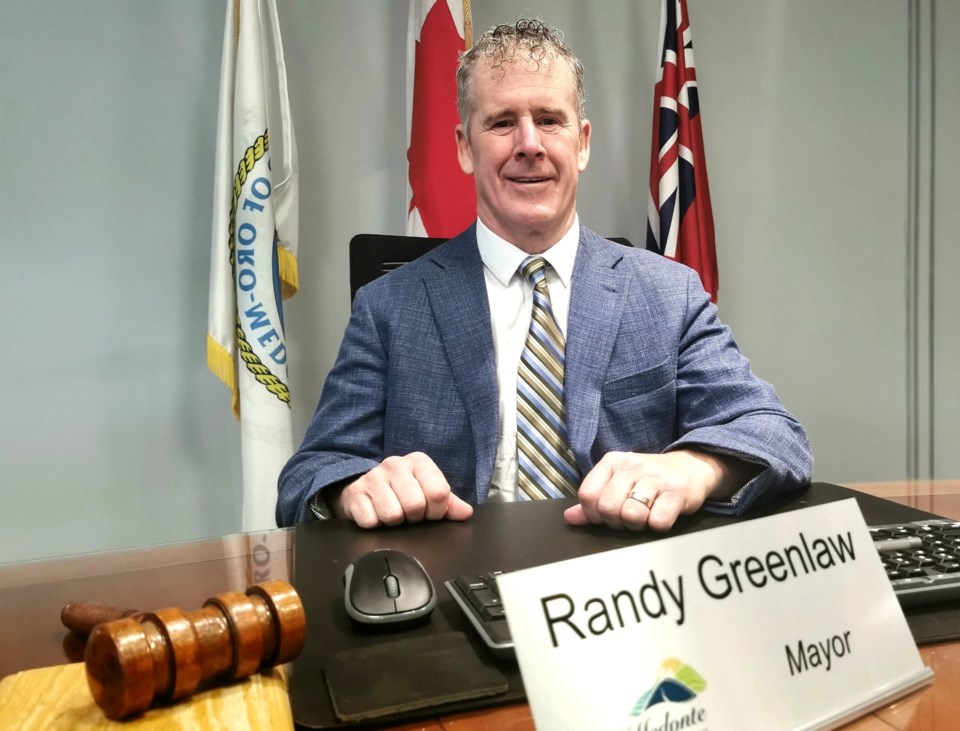Oro-Medonte Mayor Randy Greenlaw expects the "working with rookies" question. After all, he’s been asked it regularly since winning the township's mayor’s chair in last year’s municipal election.
“We’ve got an entire council who has no experience as council members,” he explained. “But what you have to look at is the township is a public corporation and all of the members of this new council, who have a broad diversity of experience, have great experiences with both public and private corporations and that’s where the value lies.”
In last October’s election, the mayor and all of Oro-Medonte’s six incumbent councillors were voted out. The incumbent mayor, Harry Hughes, was replaced by Greenlaw, who's a sales executive/entrepreneur, while the councillors were replaced by Lori Hutcheson (banking executive), John Bard (high school teacher), David Clark (chartered professional accountant), Peter Lavoie (professional engineer), Richard Schell (master plumber/high school teacher), and Robert Young (investigator with the Ministry of Attorney-General and and Ministry of the Solicitor-General and Corrections).
According to Greenlaw, he doesn't believe there was no single reason why Oro-Medonte voters opted for a complete overhaul of council.
Unlike some pundits, the 58-year-old mayor also doesn’t believe it was a case of voting the incumbents out to send a message that the residents were upset with the direction council was taking.
“I don’t think there was one specific thing,” he said. “I think those who won campaigned better and offered folks a choice.”
Greenlaw says one of those choices was an open ear. This council is committed to listening to the community, he adds, something they’ll be doing often as they continue to work on important issues, including transparency, short-term rental accommodations, cannabis production facilities, and the high cost of litigation.
“I think communication transparency is definitely a big issue,” he said. “We have to reach out and better communicate. We’re trying to engage things like an advisory group to give us more tools to engage the community to be part of helping us understand things.”
The current council has also inherited “a lot of stuff that was in camera,” said Greenlaw, so local politicians are obligated to keep those discussions behind closed doors until those issues are resolved.
“We want to bring out publicly as many things as we can bring out publicly,” he said.
While in-camera sessions will still be needed, they should be fewer and more strategic, the mayor added. Many of them will be focused on legal issues.
Oro-Medonte has had a number of high-profile — and costly — legal issues over the past couple of years and it doesn’t look like it’s going to slow down anytime soon.
In the first quarter of 2023, from January to March, Oro-Medonte has spent $327,339.51 on legal costs. The 2023 budget for legal is $428,900.
“A priority, I think, is closing some of the files we inherited — short-term rentals, cannabis, Zone 1 water, and a couple of other issues that aren’t quite as significant — to minimize our expenditures for legal,” said Greenlaw, adding the high cost of litigation is costing everyone in the township.
“At the end of the day, the money’s got to come from somewhere.”
That somewhere, of course, is the taxpayer.
Being primarily an agricultural community, Greenlaw says about 95 per cent of the township’s tax revenue comes from the residential sector.
There’s not a large industrial tax base in Oro-Medonte and that’s something Greenlaw wants to change. He sees that sector as a potential solution to some of the township’s financial challenges.
But, he cautions, it’s not easy.
“We think there’s a great opportunity to develop the area around Line 7 and the Highway 11 corridor,” he said. “Industry wants to be close to transportation networks so they can get their goods to their consumers easily and efficiently.”
Oftentimes, the opportunity to grow is limited. Oro-Medonte is sandwiched between two large urban areas — Barrie and Orillia — and it doesn’t really have total control over its own region. It has to deal with the province.
Greenlaw said the township is working with the province to identify and expand areas they would like to zone industrial, but so far their recommendations have been nixed by the province.
“We’re definitely going back to them,” he said. “We need to be able to grow all sectors at the same time. We don’t want one chasing the other, it won’t work.”
If the township can attract the right industries, it has the opportunity to organically raise revenues. Industry needs workers and workers need somewhere to live.
“It’s all about the balance,” Greenlaw said. “We offer a great lifestyle and we want to maintain our agricultural heritage, but we also need to bring in new industries and continue to grow.”
